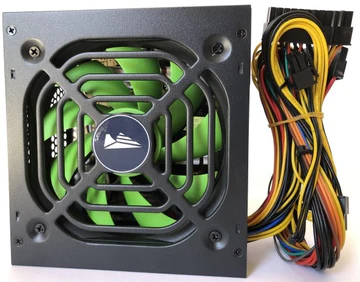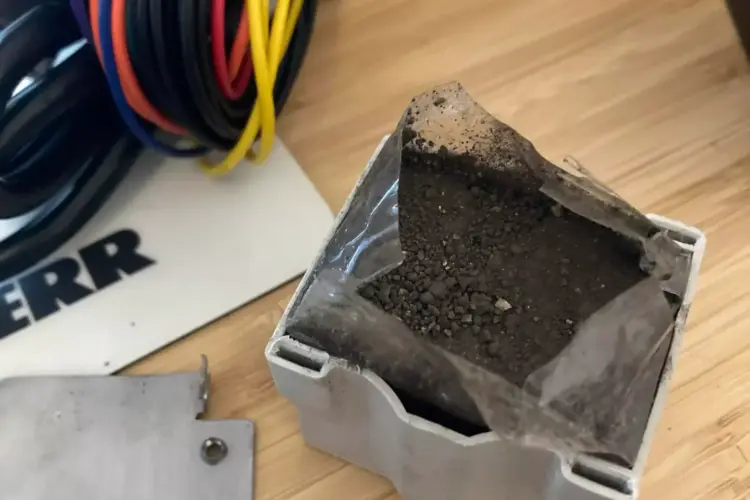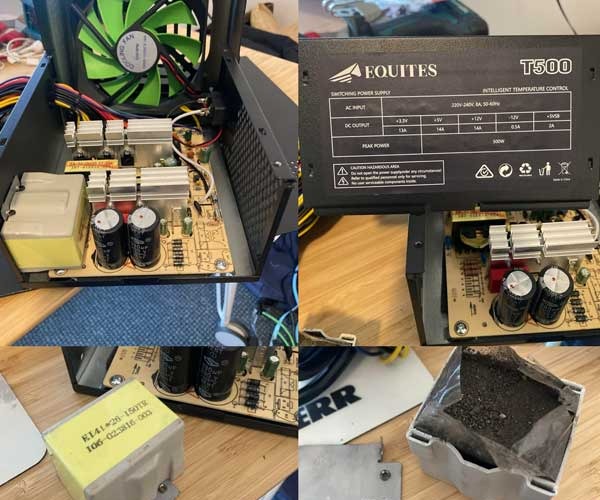Recent reports reveal hazardous designs and fake weight additions in a low cost PSU. This highlights concerning budget PC component market trends. As profits narrow, some manufacturers disregard safety standards. They use deceptive tactics to increase sales. Consumers must educate themselves to evaluate budget components. This protects purchase dollars and system integrity.
The Story: Suspicious ‘Upgrades’ Found in The Low Cost PSU
A Reddit user and value-focused builder, RedditCringe990, purchased an Equites T500 PSU. This 500W unit had an unexpected internal discovery.

A large, dense iron block occupied space next to key PSU parts. The block lacked wiring connections to other components. Calculations showed the block nearly matched the PSU’s shipping weight.

It became clear that the iron had likely been added just to make users think they were getting a heavy-duty, high-quality PSU based on its mass alone. This deception distracts from the fact that many other vital features were missing from the unit.

Lacking Vital Safety Protections
Experts found no safety protections in the PSU. There was no overcurrent, voltage fluctuation, excess temperature or short circuit protection. One small spike or hot day could cause catastrophic failure. Enough sparks or heat may damage connected components. No reputable manufacturer ships PSUs sans safety suite features.
Non-Existent Quality Control & Regulation Standards
While innocuous alone, the block and missing protections reveal issues. Systemic quality control and regulation budget PC market shortcomings show. Slim profit margins per PSU see some brands cut corners. They increase supply output and sales volumes to collect worthwhile profits. This banks on less informed customers focusing on technical specifications only during purchases.
Limited safety requirements allow inferior or hazardous PSUs to list alongside high-quality ones on popular retail sites currently. Without thorough vetting, these listings become minefields for entry-level system builders to navigate through. More rigorous regulations would assist, but simple consumer awareness steps make equal impact…
Origin of Equites T500 PSU
The Equites T500 PSU is a 500W power supply unit (PSU) targeted towards budget-conscious PC builders. It is 80+ Bronze certified, meaning it is guaranteed to be at least 82% efficient at 50% load. It comes with a 120mm fan for cooling and features basic protection against over-current, over-voltage, and short circuits.
Unfortunately, the exact origin of the Equites T500 PSU is unknown. It is likely an OEM (Original Equipment Manufacturer) product, meaning it is manufactured by a third-party company and rebranded by Equites. This is a common practice in the PSU industry, and it allows brands like Equites to offer affordable PSUs without having to invest in their own manufacturing facilities.
Here are some additional details about the Equites T500 PSU:
- Power output: 500W
- Efficiency: 80+ Bronze
- Fan size: 120mm
- Protection: Over-current, over-voltage, short circuit
- Warranty: 2 years
The Potential Consequences of Using Low Cost PSU: Multiple Layers of Risk
Safety and Component Damage Risk
Foremost, lacking protections like overcurrent or short circuit safeguards means abrupt, catastrophic failure potential under irregular conditions. Internal faults may release significant heat buildup. Sparks could damage components like the motherboard, GPU and drives.
Inconsistent power delivery might also corrupt data storage drives over time. Power fluctuations may degrade CPUs or RAM, shortening usable lifespans through excess component stress.
Fire Hazard
Additionally, lacking electrical protections, the added iron mass increases fire risk if temperatures rapidly spike in the chassis. The extra thermal mass could interfere with safe operating temperatures during normal loads too.
One overheated capacitor may spread a difficult to contain fire with the PSU’s tight housing and nearby flammable materials. This turns a safer component into a potential tinderbox issue.
Deceptive Marketing Damages Reputation
Immediately, destroyed components or fires impact individual consumers. However, fake weight additions and overstated wattages also erode market trust in budget parts suppliers overall.
Even less technical buyers could rightfully feel distrust discovering underperformance specifications. This breeds suspicions negatively impacting associated budget brands too in an already low margin industry.
In summary – from presenting electrical and ignition risks to degrading transparency and trust – the cut corners disproportionately impact relative to any single brand’s profit gain. More rigorous quality and consumer protection protocols would help mitigate risks.
Best Practices in PSU Selection
When selecting a PSU, look past just wattages or price tags. Implement these tips for quality:
Consult PSU Tier Lists
Community-sourced PSU Tier Lists classify units by aggregating lab testing data, in-depth reviews and reliability reports. Stick to Tier A or B selections demonstrating stellar safety protections and performance.
Verify 80 PLUS Certifications
While not a total quality guarantee, 80 PLUS efficiency certification levels do require verified minimum percentages under various loads. This adds responsible design assurance.
Research Internal Component OEMs
Learn the PSU’s internal component manufacturers controlling reliability. Quality vendors of key parts like capacitors include Japanese companies such as Nippon Chemi-Con.
Compare Protection Specs
Dig into technical overload, over-current, temperature, voltage and short circuit protection specifics. What automatic safety cut-off thresholds activate during irregularities?
Confirm Warranties
While 1-2 year warranties now come standard, 3-7+ years point to outstanding projected longevity and manufacturer confidence. Register warranties for further support.
In summary, purchasing checklists help minimize nasty surprises down the line. Always scrutinize critical PSU safety nets and standards before buying. Further expand research into any aspect needing more attention.
What To Do If You Suspect a Faulty PSU in Singapore
If you believe your desktop computer’s power supply unit may be defective, unreliable, or potentially hazardous in Singapore, prompt action is advised. Faulty PSUs can damage connected components or pose ignition risks if quality issues are present. Here are top troubleshooting and repair recommendations:
Inspect Your PSU
Carefully examine your installed unit for any apparent damage, listen for abnormal noises during operation, and smell for burning smells signalling a problem. Also double check that cables are fully secured.
Run Diagnostics
Use software tools like the OCCT PSU test to stress test power delivery and trigger any latent defects to observe. Monitoring apps can also track for unusual voltage/ripple readings.
Arrange Assessment with Professional Computer Repair Shop Near You
For comprehensive evaluations by those able to disassemble units, skilled PC builders like Singapore’s Volta PC Upgrade & Repair offer affordable PSU testing, repairs and quality replacements. Their technicians can determine true root causes.
Report Non-Compliant Products
If clear quality control issues are uncovered, be sure to also file reports about substandard PSU units with national consumer electronics authorities. This helps identify potentially dangerous products still distributing locally.
Paying attention to PSU warning signs combined with leveraging available technical resources provides the best resolution path. Don’t hesitate to enlist assistance assessing and troubleshooting units showing risk factors.
Frequently Asked Questions About Power Supply Units
How crucial is a PSU to a custom PC system?
As the “heart” providing power, the PSU impacts the stability, performance, and longevity of all connected components. A robust, efficient PSU is vital for minimizing crashes and enabling overclocking.
What wattage PSU do I need for my setup?
Select a PSU offering at least 100W extra beyond total system part power draw. Online PSU calculators can estimate needs for specific CPUs, GPUs etc. Budget growth buffer too!
Do higher wattage PSUs negatively impact bills?
No – higher rated PSUs only draw as much power as a system actually uses even if max capacity outstrips demand. It runs at higher efficiency rates too.
Is a 80+ certified PSU worth the cost?
Yes, 80 PLUS ratings (Standard, Bronze, Silver, Gold, Platinum, Titanium) signify increasing electrical efficiency, lessening energy waste. This generates long-term savings.
Any easy diagnostic checks to self-test my PSU?
Listen for unusual noises under load. Use software like OCCT PSU tests to stress capabilities. Monitor voltages with apps. If concerned, contact repair pros for thorough evaluations.
Conclusion
In closing, this examination of questionable design choices and misleading marketing tactics employed in one budget-priced power supply unit reveals broader systemic pressures swirling in the entry-level PC component marketplace today. With razor thin profit margins per unit, certain manufacturers feel incentivized to cut corners on safety and quality control – directly risking consumer devices and trust in the process.
While regulations and consumer awareness can work to counterbalance these forces, the discovery of non-functional weights and missing electrical protections within an Equites 500W PSU should serve as a cautionary tale in the meantime. There is no substitute for diligent inspection of power supply quality and rated capability. As this story illustrates, when purchasing technology products, one truly gets what they pay for. By investing upfront in robust PSU safeguards certified by reputable vendors, PC builders hedge against hazardous defects and performance gaps bound to electrically or financially shock down the line.
If you have any issues with your power supply unit or desktop computer in Singapore, reach out to the knowledgeable technicians at Volta PC Upgrade & Repair for service and support.
- Address:
- Tai Seng Branch: 8 Burn Road #01-04, Trivex, Singapore 369977
- Jurong Branch: Blk 132 #01-279C, Jurong Gateway Road, Singapore 6001324
- Contact:
Whatsapp us | Call 69500453 | Telegram us
—
